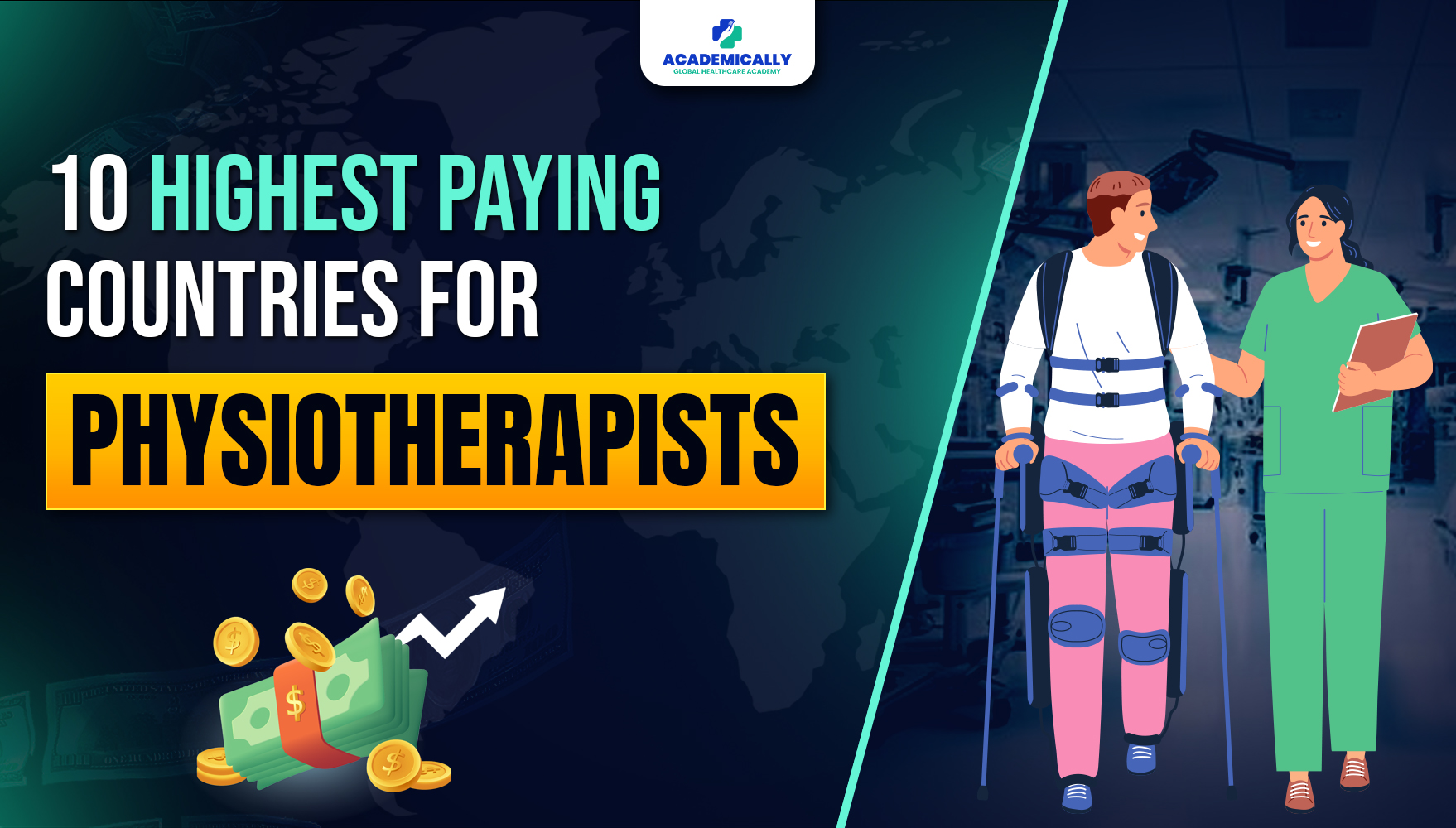Highest Paying Countries for Physiotherapists
Below is a list of the top 10 highest-paying countries for physiotherapists, their average salaries and the registration process in each country.
1. Switzerland
Switzerland is globally recognised for its efficient and high-quality healthcare system. With a heavy shortage of skilled medical professionals due to extreme weather conditions and a small population, Switzerland offers lucrative salaries to global physiotherapy professionals. Physiotherapists in the country enjoy a remarkable level of respect within the healthcare community, with an average annual salary of USD 88,481.
To be able to work as a registered physiotherapist in Switzerland, you need to get your degree recognised by the Swiss Red Cross (SRC).
2. Canada
Canada consistently ranks among the top countries for physiotherapy practice, offering a well-established healthcare system and a commitment to quality patient care. Physiotherapists in Canada earn an average annual salary of USD 77,937, with top cities including Vancouver, Toronto, and Ottawa.
To become a registered physiotherapist in Canada, you must clear the National Physiotherapy Competency Examination (NPCE).
3. New Zealand
New Zealand, known for its focus on outdoor activities and laid-back lifestyle, attracts physiotherapy professionals with an average annual salary of USD 72,734. The highest-paying cities include Wellington City, Auckland City, and Christchurch.
To work as a registered practitioner in New Zealand, you need to be registered with the Physiotherapy Board of New Zealand and obtain an Annual Practising Certification.
4. United States of America
In the United States, a sought-after destination for healthcare professionals, physiotherapists find vast opportunities in diverse practice settings. The average annual salary for a physiotherapist in the U.S. is USD 71,423, with top-paying cities including Los Angeles, Austin, and Richmond.
The National Physical Therapy Examination (NPTE) conducted by the Federation of State Boards of Physical Therapy is the exam global physiotherapists need to clear to be eligible to practice as physiotherapists in the USA.
5. Norway
Norway offers physiotherapists a high standard of living and a well-organized healthcare system, with an average annual salary of USD 70,363. The country's emphasis on preventive care and commitment to research and innovation create an environment conducive to professional growth.
6. Sweden
Sweden, celebrated for its progressive healthcare system, provides physiotherapists with a collaborative environment and opportunities for research and innovation. The average annual salary for physiotherapists in Sweden is USD 66,279, with top-paying cities including Presque Isle, Ellsworth, and Waterville.
You will require a Swedish license, which the Swedish National Board of Health and Welfare offers to global physiotherapists after they showcase their proficiency in the Swedish language.
7. The Netherlands
The Netherlands, known for its excellent quality of life, prioritises preventive care in its healthcare system. Physiotherapists in the Netherlands earn an average annual salary of USD 64,306.
You need to meet the requirements of the Physiotherapist's Evaluation Framework and work for 5 years as a physiotherapist in the Netherlands to get a license to work there.
8. Singapore
Singapore, a healthcare hub in Asia, offers physiotherapists access to state-of-the-art facilities and diverse patient populations. With an average annual salary of USD 63,333, physiotherapists in Singapore can explore opportunities in cities like Bukit Timah, Orchard, Queenstown, and Harbourfront.
To be eligible to work as a physiotherapist in Singapore, you need to complete a degree programme recognised by the Allied Health Professions Council (AHPC) and then obtain the license after gaining the required work experience.
9. Australia
Australia boasts a robust healthcare system and a growing demand for physiotherapy services. Physiotherapists in Australia enjoy opportunities for career advancement, a favourable work-life balance, and an average annual salary of USD 58,747. Top-paying cities include Perth, Hobart, and Sydney.
To migrate, settle and practice as a physiotherapist in Australia, global physiotherapists need to clear the APC written assessment conducted by the Australian Physiotherapy Council.
10. United Kingdom
The United Kingdom, home to a well-developed healthcare system, provides physiotherapists with diverse work settings, including the National Health Service (NHS) and private clinics. The average annual salary for physiotherapists in the UK is USD 49,651, with the highest-paying cities including London, Leeds, and Newcastle.
To be able to practise as a physiotherapist in the United Kingdom, you need to get registered with the Health and Care Professions Council (HCPC).
Factors Affecting Salaries
The salaries of physiotherapists worldwide are influenced by a variety of factors, reflecting the diverse nature of healthcare systems and economic conditions in different countries. Factors such as location, job role, organisation in which they are employed and years of experience etc., impact the level of remuneration. Have a look at the most important decisive factors below.
Geographic Location
Salaries can vary significantly based on the country and region. High-cost-of-living areas or countries may offer higher salaries to compensate for living expenses. However, sometimes, opportunities in the regional areas (such as in the case of Australia) pay more to invite and encourage skilled workers to work outside the cities.
Economic Conditions
The overall economic health of a country or region plays a crucial role. Countries with a robust economy often have the capacity to offer higher salaries to healthcare professionals. European and third-world countries with strong economic ecosystems have thus always been hotspots for physiotherapists and other healthcare professionals.
Experience and Expertise
Physiotherapists with more years of experience or specialised expertise in areas such as neurology, pediatrics, or sports rehabilitation may command higher salaries. The level of qualification and years of experience play a decisive role in salaries.
Education and Certification
Advanced degrees, certifications, and additional training can contribute to higher earning potential for physiotherapists. Specialised certifications or postgraduate qualifications may enhance the marketability of physiotherapists in a region.
Healthcare System Structure
The structure of the healthcare system in a particular country can impact salaries. Publicly funded systems may have different salary structures compared to those with a stronger private sector influence.
Demand and Supply
The demand for physiotherapy services and the number of qualified professionals in a region can affect salaries. Shortages of physiotherapists may lead to higher compensation to attract and retain talent. In countries like Switzerland, there is a high demand due to the small population and shortage of skilled physiotherapists, and thus the salary is the highest.
Government Policies
Government policies related to healthcare funding, reimbursement rates, and labour regulations can influence physiotherapists' salaries. Australia, for instance, has an outstanding remuneration policy for healthcare workers, which positively affects the salary levels of physiotherapists and other professionals.
Facility Type
Physiotherapists working in hospitals, private clinics, rehabilitation centres, or academic institutions may experience variations in salaries. The type of facility and its financial structure can affect compensation. A well-established facility can help you earn more, while a small clinic or recently established facility might not afford high salaries.
Work Hours and Conditions
Factors such as working hours, overtime, and the overall work environment can impact salary negotiations. Physiotherapists working in challenging or high-demand settings may receive higher compensation. Healthcare professionals like physiotherapists who work in association with the military have higher pay due to the demanding nature of the role.
Parting Thoughts
While considering salaries is a crucial thing before making the move, you must also consider other factors to ensure your physiotherapy career is truly rewarding. Parameters such as quality of life, workload, government benefits, etc, play a decisive role in making your life and your career sumptuous. Therefore, we suggest that before making a final decision, you must acknowledge the other factors that make life liveable in these countries and then choose to relocate.
In case you need any assistance or guidance in clearing foreign registration exams and setting up practice there, get in touch with Academically today.
Academically is a global healthcare academy that helps global healthcare professionals crack foreign registration exams and pave the way for a rewarding and well-paying career.
Fill up this form for a free one on one counselling session.



